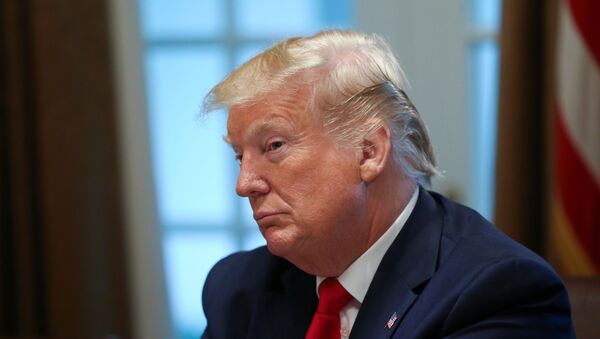In an interview with CNN's The Situation Room, Senate Foreign Relations Chairman James Risch has disclosed that Donald Trump is a president who "doesn't want to go to war" and revealed the commander-in-chief's hesitations on strikes against Iran.
"I really watched him agonise over this. It comes down to one man", Risch told reporters.
Risch was not the only person to have observed how hard it was for Trump to make a decision; House Armed Services Chairman Adam Smith also said that the president was "really wrestling with it".
While the head of state struggled with his own dilemma, this uncertainty was fuelled by his own national security team, who unannamiously believed that Washington should retaliate for the downed US drone by hitting Iranian targets, CNN reported.
"There was complete unanimity amongst the President's advisers and DOD leadership on an appropriate response to Iran's activities. The President made the final decision", an unnamed senior administration official was quoted as saying.
Even though Trump initially warned that Iran had made a "very big mistake" by bringing down an American drone, which the Iranian side claimed had violated its airspace, he revealed the last-minute change of heart by halting the scheduled strikes on Tehran minutes before they were set to be carried out.
Iran made a very big mistake!
— Donald J. Trump (@realDonaldTrump) 20 июня 2019 г.
In a Friday interview with NBC, the US president reiterated what he had already said in a series of tweets: he aborted the mission after a general told him that approximately 150 Iranians would die in the strikes. According to Trump, the loss of life was not proportionate to the downing of a single unmanned drone.
....On Monday they shot down an unmanned drone flying in International Waters. We were cocked & loaded to retaliate last night on 3 different sights when I asked, how many will die. 150 people, sir, was the answer from a General. 10 minutes before the strike I stopped it, not....
— Donald J. Trump (@realDonaldTrump) 21 июня 2019 г.
....proportionate to shooting down an unmanned drone. I am in no hurry, our Military is rebuilt, new, and ready to go, by far the best in the world. Sanctions are biting & more added last night. Iran can NEVER have Nuclear Weapons, not against the USA, and not against the WORLD!
— Donald J. Trump (@realDonaldTrump) 21 июня 2019 г.
The US nearly resorted to a direct confrontation with Iran following an announcement by the Islamic Revolutionary Guard Corps (IRGC) that it had downed a US drone over the waters of Hormozgan Province. The Iranian elite unit claimed that the UAV had violated Iranian airspace - an allegation Washington has strongly denied, saying that its drone was operating over international waters in the Strait of Hormuz.
The IRGC commander-in-chief warned that the downing was a "clear message" to the US that Tehran would "react strongly" to any aggression.
Meanwhile, IRGC Aerospace Force commander Brig. Gen. Amir Ali Hajizadeh revealed that Iran had warned the US military twice before bringing down the drone, but since it failed to reply, and the UAV made no change to its trajectory, they shot it down.
#Iran’s purpose by shooting down the drone was to warn the "#US terrorist forces" as it could also target an #American P-8 military aircraft that was flying next to MQ-4C drone, but it didn’t: Brigadier General Hajizadeh pic.twitter.com/V6xT8YwB31
— Tasnim News Agency (@Tasnimnews_EN) 21 июня 2019 г.
The military official further claimed that Iran's air defence troops stopped short of hitting a US reconnaissance plane which was flying not far from the downed drone, and added that the plane was identified as a Boeing P-9 Poseidon with 35 airmen on board.
The Pentagon has not commented on the claims yet.
The drone incident is just the latest spike in US-Iran tensions, with Washington deploying an aircaft carrier strike group and a bomber task force, as well as additional 1,000 troops to the Middle East in what National Security Adviser John Bolton described as a "clear and unmistakable message" to the Islamic Republic that any attack on American interests or those of its allies would be met with "unrelenting force".
US authorities have as well accused Tehran of orchestrating sabotage attacks on oil tankers off the UAE coast in mid-May and in the Gulf of Oman in early June, while Iran hit back by saying that the claims were made "without a shred of factual or circumstantial evidence".



